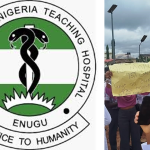
TELA Maize’s ‘Success’ Questioned As Research Organisations Behind Glowing Report Revealed To Be Gates-Funded

A wave of praise for genetically modified (GMO) TELA maize is sweeping across Nigerian media, backed by glowing reports of higher yields, greater profits, and reduced pesticide use. But beneath the surface of this whitewashing effort lies a growing concern over the credibility and independence of the science behind these claims. At the centre of the controversy is a familiar name:
The Bill & Melinda Gates Foundation.
The TELA maize project, hailed as a solution to pest resistance and climate pressure on African farms, is being rolled out by Nigeria’s Institute for Agricultural Research (IAR) in partnership with the African Agricultural Technology Foundation (AATF) and the International Maize and Wheat Improvement Centre (CIMMYT). On paper, the initiative promises significant benefits: up to 54 per cent higher yields, reduced pesticide applications, and increased net profits for smallholder farmers. But all of the trials and research validating these claims have been funded and coordinated by organisations directly bankrolled by the Gates Foundation.
This is a classic case of grading your homework. The same institutions that develop, promote, and profit from this GMO seed are the ones conducting the studies that claim it’s a success. That’s not science, that’s marketing with a lab coat.
Reports from mainstream Nigerian outlets, such as Punch and Science Nigeria, highlight recent on-farm trials involving 120 farmers, which allegedly show TELA maize outperforming conventional varieties across multiple indicators. However, these trials were organised and managed by AATF, the very same group co-developing the GMO seed. CIMMYT, another research partner, receives core funding from the Gates Foundation and is part of the CGIAR network, which itself is heavily influenced by Gates-backed philanthropy.
This setup undermines any claim of objectivity, as the developer, the funder, and the evaluator are essentially the same entity. Consequently, the scientific process becomes compromised. This is not an independent review; it is a donor-driven agenda disguised as agricultural innovation.
The broader concern is that these GMO crops are being introduced without adequate independent biosafety assessments or long-term health and environmental impact studies. Nigeria’s regulatory institutions, such as the National Biosafety Management Agency (NBMA), are underfunded and non-transparent, with few publicly available records of safety reviews conducted on TELA maize.
Meanwhile, government officials and pro-GMO “scientists” frequently cite global institutions like the WHO or FAO to lend legitimacy to approvals, even though no third-party scientific audits appear to have been conducted on this specific crop.
The issue is not just scientific, it’s geopolitical. A 2023 investigative report by The Nation described the Gates Foundation’s agricultural interventions in Africa as a form of “new colonialism,” whereby Western donors and corporations reshape African food systems around patented seeds, external inputs, and donor-dependent technologies. The rollout of TELA maize in Nigeria closely fits this model: a foreign-funded solution, validated by foreign-funded science, delivered with minimal input from local farmers’ unions or ecological researchers.
Farmers are being reduced to test subjects. They are promised profits, but they’re not told about the long-term risks or dependency on proprietary seed systems. The same people pushing the seed are the ones telling them it works. Where’s the independent oversight?
TELA maize, like Bt cotton before it, raise profound questions about who benefits from it. While some farmers may see short-term gains, the long-term implications, from pest resistance to seed dependency, remain unexamined and unregulated. And when the science itself is shaped by those selling the product, public trust reduces further.
However, some farmers involved in the trials have reported positive results, while others remain cautious, noting that short-term yield boosts do not always translate into long-term sustainability.
Introducing insect-resistant GMO maize could lead to increased resistance in pests over time, a trend already documented in parts of the Global North. In South Africa and parts of the U.S., fall armyworm has already shown signs of resistance to the same Bt traits engineered into TELA maize, a pattern likely to repeat if the crop is rolled out widely without monitoring and seed diversity.
As the Gates Foundation continues to expand its footprint in African agriculture, there is an urgent need for an immediate halt to the unchecked rollout of GMO crops without independent review, complete public transparency, and meaningful consultation with affected communities. Until then, the TELA maize story remains less a tale of scientific triumph and more a case study in corporate-funded self-validation masquerading as progress.
You don’t let oil companies write environmental regulations. So why is Gates writing the rules and scoring his own test?
Read More:
- C.J. “Fiery” Obasi Crafts a New Vision for African Cinema at Locarno
- FG Reverses 18-Year University Entry Policy but Quietly Reinforces It by Setting JSS Entry Age at 12
About The Author
Related Articles
AES Condemns Niamey Airport Attack, Warns of Coordinated Destabilisation
The Alliance of Sahel States has strongly condemned the armed attack on...
ByWest Africa WeeklyFebruary 2, 2026Mali Cedes Strategic Land to Guinea to Deepen Trade Cooperation
Mali has approved the transfer of a strategic parcel of land to...
ByWest Africa WeeklyFebruary 2, 2026Senegal to Appeal CAF Sanctions After AFCON Final Controversy
Senegal has announced plans to formally appeal the sanctions imposed by the...
ByWest Africa WeeklyFebruary 2, 2026Burkina Faso Takes Legal Step Toward Nuclear Energy Development
Burkina Faso has voted to join the Vienna Convention on Civil Liability...
ByWest Africa WeeklyFebruary 2, 2026












Leave a comment